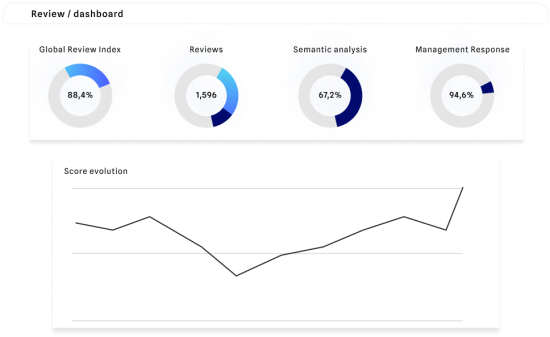
Online Reputation: The Guide to Managing Your Digital Presence
Online reputation is of crucial importance for businesses. How is it built? What risks are involved? And how can you proactively manage it?

The fundamental principles of online reputation for businesses
Digital presence and online reputation
It’s impossible to ignore the fact that our work, hobbies, and communications are increasingly happening in the digital realm. As our lives become more digital, we create a “digital presence” that sometimes slips out of our control. This has real consequences for online notoriety, or “online reputation,” particularly for businesses, brands, institutions, and public figures who need to maintain a positive image online. In the age of the internet, reputations can crumble much faster than they are built. A single unfortunate tweet or an ambiguous video can damage one’s reputation significantly. That’s why effectively managing online reputation has become a critical concern for businesses and public figures. So, how can you take control? How can you ensure that your digital image remains authentic and unaltered?
What is online reputation?
Online reputation can be defined as the image projected by an entity (individual, business, brand, association, institution…) or a product/service on the internet. It encompasses all the information available on the network and is shaped by three fundamental elements: digital footprint, brand image, and third-party content (as described below). The vast majority of online content is shared on platforms beyond our control. This raises the challenge of managing online reputation: how can we maintain control over our digital image when it is largely influenced by others? It becomes necessary to employ alternative strategies and ideally seek assistance from a specialised agency in online reputation management.

The building blocks for establishing a company’s online reputation
-
Digital footprint
The digital footprint refers to the traces left by each internet user, whether intentionally or unintentionally. Every online action, such as publishing content, sending emails, conducting searches, or visiting web pages, contributes to this footprint. For representatives of a company, every interaction on the web is bound to leave a lasting impact.
-
Brand image
The concept of brand image, or brand identity, encompasses all the distinctive elements associated with a brand: visual design, logo, preferred communication channels, slogans, media presence, and more. The advantage lies in the fact that businesses have control over these aspects and can utilise them to shape the public perception of their activities. Thus, brand image serves as a crucial pillar of online reputation.
-
Third-party content
Third-party content refers to all the content published by individuals or entities without direct or indirect affiliation to the company. This includes contributions from the general public, prospects, clients, partners, competitors, public figures, and others. Such content can be found on various web platforms, including third-party websites, blogs, media outlets, forums, rating platforms, and, of course, social media.
A concrete example
A major brand in the agri-food industry is facing a controversy surrounding one of its products. While effectively managing its communication on its own platforms such as the group’s website, blog, and social media accounts, the brand quickly finds itself overwhelmed by a significant influx of negative information. This information comes from the media, individuals, and even competitors who aim to exploit the situation and amplify its negative impact on the brand’s online reputation. As a result, this third-party content has a detrimental effect on the company’s image, leading to tangible consequences on sales and revenue. So, what’s the solution? It involves shifting the narrative by strategically promoting a positive brand image to “drown out” the negative buzz with content that showcases the company’s strengths.
“It takes twenty years to build a reputation and five minutes to ruin it.”

The main aspects of online reputation
The web and the court of public opinion
The reason why online reputation holds such importance for businesses and brands is because public opinion reigns supreme in the market, and shaping that opinion happens predominantly through the internet. The web is the primary source of information—according to an IFOP survey, 98% of internet users turn to it for news, product details, and more—making it the go-to platform for research before making a purchase. However, the internet possesses a unique characteristic: it allows for freedom of expression, and users take full advantage of this liberty, sometimes even to the point of excess. In France, one in two individuals believes they have the right to publicly express their thoughts about a brand, company, or leader. This conviction is further bolstered by the relative anonymity provided by the online realm, enabling unrestrained behaviour. Given this newfound power, remaining silent is a risky proposition. In times of crisis, 65% of French consumers expect companies to issue apologies or, at the very least, respond promptly.
What are the key drivers of online reputation to monitor?
The challenge becomes even more intricate as the drivers influencing online reputation multiply and gain significance, encompassing both web platforms and the individuals capable of publishing content. So, what are these drivers?

-
Search engines
Google, Bing, Yahoo!, Baidu… The search engine results that rank highest and receive the most clicks have the potential to influence users’ opinions. As it’s challenging to control the content on third party websites, it is crucial to take specific measures to prevent the proliferation of fake news in the top results of the search engine results page (SERP).
-
Different social media platforms
Facebook, Twitter, Instagram, LinkedIn… These platforms for informal communication can be difficult to manage effectively, requiring a tight moderation strategy. It is not uncommon for an online reputation to be made or broken on these platforms, and problematic content, even if deleted, has a tendency to resurface. Politicians are well aware of this, as they often face past statements made months or even years ago.
-
Platforms for open expression
Blogs, forums, video-sharing platforms (YouTube)… On these platforms, internet users have the freedom to express themselves, often with little to no moderation. The consequences for online reputation can be significant when the volume of negative content or comments becomes excessive. The most effective approach is to leverage these platforms to create positive and empowering content.
-
User review platforms
Google, TripAdvisor, Yelp, Trustpilot… These tools are highly popular among internet users when they want to gather information about a company or brand. In fact, 88% of consumers consult online reviews before making a purchase (IFOP study cited by Forbes). Unfortunately, these platforms are also breeding grounds for false information, including purchased positive reviews, malicious comments, and defamatory or abusive messages.
-
The company and its employees
While a company may have full control over its brand image, the behaviour of its employees can sometimes have a negative impact on its online reputation. Communication errors, controversies surrounding products or services, the leaking of confidential information, or even questionable messages posted on personal social media accounts can have long-lasting detrimental effects.
-
Online influencers
With their omnipresence on social and streaming platforms, influencers hold considerable authority among their dedicated communities. However, this authority can also be turned against companies and brands, particularly when it comes to testing a new product or service. You need to consider this aspect when developing your online reputation strategy.
-
Competitors
A company should never overlook its competitors, especially the more direct ones, and their potential to cause harm. Fabricated negative comments, false controversies propagated through the media, ad hominem attacks… These unsavoury tactics exist and can significantly impact (and endure) the online reputation of an organisation. Responsiveness is essential: it’s crucial to promptly extinguish any fire before it spreads to the public.
Online reputation:
What are the risks?

For businesses and brands, a poorly managed online reputation carries significant risks. While having a positive reputation is beneficial for business, a negative buzz can have immediate and far-reaching consequences such as boycotts, negative media campaigns, and decreased sales. Well-known cases like Volkswagen’s emission manipulation scandal, Facebook’s Cambridge Analytica data breach, or Samsung’s explosive Galaxy Note 7 batteries have had lasting impacts on these brands. Surprisingly, many companies are ill-prepared to handle these risks, with 45% of marketing executives having no contingency plans for communication during major events that could impact their online reputation.

-
47%
of French consumers
have refrained from purchasing a product or service from a brand due to damage to its reputation. -
82%
of consumers
are willing to boycott a brand that takes a stance contrary to their personal values. -
60%
of marketing executives
have experienced a major communication crisis in their current or past positions.
Which strategies to employ to manage your online reputation
Managing your online reputation: a complex and multifaceted approach
There are numerous and diverse factors that contribute to online reputation. To regain control of your online reputation, a company must consider various platforms, media channels, and individuals who may post content that undermines it – even within the organisation itself, due to negligence or lack of awareness. Dealing with this complexity requires implementing an appropriate strategy to ensure that the desired image aligns with the public’s perception. This involves activating a range of effective strategies, preferably with the assistance of a specialised agency in online reputation management.

Key strategies to manage your online reputation
-
Step 1
Conduct thorough web monitoring
How is your company being discussed on the Internet? To find out, it is essential to monitor online conversations. Perform a Google search for your company/brand or your product/service and review the search results. Set up alerts for relevant terms and utilise web monitoring tools like Netvibes or Feedly for comprehensive monitoring, as well as Meltwater or Hootsuite for social media platforms, among others.
-
Step 2
Take back control of your digital footprint
Everything you and your employees post on the internet, whether as executives, managers, or marketers, contributes to your “digital footprint.” This footprint can significantly influence your online reputation. It’s crucial to have a firm grasp on all its aspects, starting with clearly separating personal and professional activities and providing explicit guidelines to your employees.
-
Step 3
Segment activities for better management
A clear segmentation of your professional activities will empower you to maintain better control over your brand image across various platforms. For instance, if you have multiple retail locations, it can be advantageous to create dedicated Facebook pages for each store, enabling you to manage communication effectively. The same applies if you operate in diverse markets or have multiple brands.
-
Step 4
Raise awareness among employees and partners
Raising awareness among your employees and partners about the significance of online reputation is a vital endeavour. They need to understand that a company or brand is intrinsically linked to its individual members, and their conduct can impact its standing. For example, even if posts are made in a personal capacity, a company’s CFO who shares controversial content on LinkedIn risks tarnishing the reputation of the entire organisation.
-
Step 5
Protecting sensitive company data
Ensure the security of your confidential and sensitive digital data to prevent leaks, theft, and fraudulent use of information. It’s crucial to prevent hackers from taking control of your Twitter account and posting offensive tweets! Strengthen your security measures, enforce the use of strong passwords and VPNs among your employees, implement robust authentication processes, and more.
-
Step 6
Managing online reviews
Negative reviews and comments have a direct impact on your online reputation, so it’s important to prevent their proliferation, especially when they are published on external platforms. If removal is not possible, the best approach is to respond to them. This demonstrates your promptness in addressing concerns and shows that you value feedback. Additionally, encourage satisfied customers to leave positive reviews.
-
Step 7
Cleaning up problematic content
If you come across illegitimate content that could harm your online reputation, you have the right to request its removal. This includes leveraging the “right to be forgotten,” which can lead to the delisting of the content. However, note that this right primarily applies to individuals, but organisations can still report problematic content (such as on social media platforms) or directly contact webmasters to take action in their favour.
-
Step 8
Creating and publishing positive content
“Flooding” involves “drowning” negative results with a deluge of content that presents your company or brand in a positive light, ensuring its prominence on the SERP. To achieve this, focus on producing content that showcases a positive image and optimises it for SEO to push problematic results beyond the first page.
-
Step 9
Collaborating with influencers
To counter the growing importance of influencers, it’s beneficial to have them on your side! Implement an influencer marketing strategy by engaging with well-known web personalities in your industry and aiming to build relationships (or even partnerships) with them. This approach helps shape your brand image positively and minimises the risk of negative content originating from these influencers.
Our Commitment
-
Expertise
Since 2010, we have worked with over 2000 clients across 90 countries.
-
Passion
We are a team of passionate, industry-focused individuals who are committed to your success.
-
Performance
We’re committed to implementing a data-driven strategy, making a real impact on your bottom line by providing avenues for growth.
Any questions?
Online reputation refers to the image of a company, brand, public figure, or individual as it is built and perceived on the internet. It encompasses three key elements: the digital footprint (traces left by internet users during their online activities), brand image (controlled by the entity), and content published by third parties (such as internet users, media outlets, competitors, etc.).
Monitoring your online reputation is crucial as it develops independently of the company or individual involved. By keeping an eye on how the web portrays you, you can assess what is being said about you across various platforms: websites, blogs, forums, social media, review platforms, and more. It is the first step towards regaining control over your online reputation.
Effectively managing your online reputation requires implementing various strategies. Firstly, it is essential to establish web monitoring to stay informed about discussions surrounding your company or brand. Secondly, taking charge of your brand image and digital presence is crucial. Finally, mitigating negative content involves managing online reviews, addressing problematic content, and collaborating with influencers. If managing your online reputation feels daunting, we recommend seeking the expertise of an online reputation agency like Eskimoz for professional guidance.
















